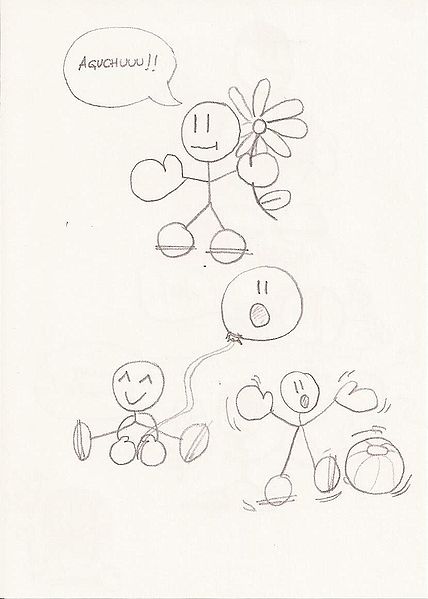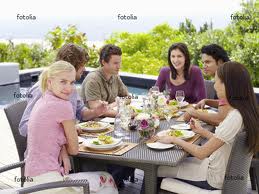Tennis Academy - the best of both worlds
A tennis academy is, at least by my definition, a single site where a child can play tennis (and other sports), and complete his formal education. There are now a few of these, say a dozen, in France.

Creche
At our local club we've had a young girl, I'll call her Sarah, who displayed great talent from a very early age. Combined with an ambitious father, we've wondered how everything would pan out, school, regional tennis training, club life, academy possibilities and tournaments.
With every developing child there are extenuating factors, things that the child can frequently do nothing about. A child can do nothing about his parents or cultural background, nor the resources or structures in his immediate vicinity. The child, but particularly the parents, must try and find solutions to problematic circumstances. What about an academy, well away from home?
Sarah came from an immigrant family. Whichever way you look at it, when you are in a minority group in your environment, you have special challenges. Your culture, and your habits do not fit those around you. The majority of people around you are doing things differently. You'll never fit in. You can accept that right from the outset, you've just got to live with it.
We aren't going to broach the hot subject of being discriminated against in sport. What is more significant is that in your environment you can be labelled by others. If that puts you into the smaller, minority group, you are fighting automatically against the mainstream.
At school, if the school is particularly oriented towards sport, and you are non-sporty, you will be isolated. A child will have difficulty developing talents in structures that are not ideal for him. Effectively, at school, there are many sub-minorities, and it isn't just ethnic ones. Being labelled, and forcibly put in a minority group ready to be victimised, is a part of school life.

Tennis culture equalised?
So Sarah is from an immigrant family, with a different religion, eating habits and family values. The local community has a few families who belong to their culture, so they are not totally alone, but we are talking about a few dozen families of similar culture, in a town of hundreds of families of local culture. The over-whelming advantage is with the locals. The locals set up the structures according to their habits and traditions. They make no special concessions for minority groups.
In Sarah's case she entered the local club with no support from her friends. There was no link between her school environment, her mates in the immediate vicinity of her home, and the ones she had at school. Just imagine her first tennis lesson. Sarah comes into a group where the other girls are all friendly with each other, and not with her. The parents of the other girls mix freely enough with each other, but her own parents are shunned by the others. She has to live with this every day so she gets used to it.
People from minorities know that they have to fight for everything twice as hard as mainstream people, so they soldier on. They cannot whine or protest. They will not be heard, and risk being even more scorned anyway.
Federation supports the mainstream
Sarah's second "problem" is her determined father. We've aleady said that he is an ambitious man, and that his culture doesn't fit his environment either.
However her father doesn't worry much about the delivery of tennis programmes locally. He has informed himself about how, ideally, to deliver tennis education to a promising child. He wants to find the most efficient way of giving his daughter a chance in life. An academy is an option. So he looks at models in the USA, in the Eastern Bloc, from where so many girls successfully enter the professional game. He looks at alternatives in France, knowing that France too has successful systems, studying meticulously how a girl can achieve great things in France. He discovers that either he has to emigrate, or he has to send his child away to a special academy in France. This will cost him, just for school fees, €13,000 per year. He cannot change his job so easily, so he himself is moving nowhere.

Calculating the tennis cost
For a couple of years the father came to an arrangement at Sarah's primary school. His daughter should get time off, to participate in free Regional Training sessions, paid for by the Federation. He was thankful for this recognition and opportunity, but it didn't work. He too had to take time off work to travel to this Regional training. It was a long way away. His daughter was losing school time too. Worse, he decided that the cultural issue was as evident at Regional as well as at local level. His daughter was not being pushed hard enough, or in the right way. The other girls were treated differently. So he stopped.
The father had meanwhile developed his own tournament programme, his own personalised academy, for Sarah. In her age group she was too good for any other girl within 50 kms. So any tournament he entered Sarah for would be a long drive, always at least a half day lost. The tournaments were endless, and then the father, quite rightly, decided to go into other regions to get other experiences. These two lost all of their weekends, all of their holiday time. The mother never saw them!
Keep the education going
For a while he took Sarah out of school early to give her extra private lessons with the local pro. Now the travelling was not such a problem. However, he was still losing some work time, Sarah was still losing some school time, and worst of all, the lessons were costing him a fortune. Finally he decided that the coach was only getting rich at his expense, buying bigger and better cars, and not developing Sarah quickly enough. Sarah's development was not the club coach's priority. He had other club interests at heart. The father told me that all this was costing him around € 1500 per month.
Is your coach being honest with you?
Now Sarah has gone to the academy. The experiments of Primary School have not worked, but at least Sarah has been close to the family home until the age of ten or so, at least she hasn't been too messed around with her schooling. Her tennis development has been spasmodic, but hopefully this can be corrected in the years to come.
Sarah is still in France, but is now in the South, with better weather and facilities and coaches. She is 800 kms away from her father. Now she lives with her mother in a local apartment, and apartments in the touristy South don't come cheap. Sarah spends half her week in school classes at the academy, and the other half hitting balls or doing fitness sessions. At weekends the school organises tournaments tours.
What more could she want?
